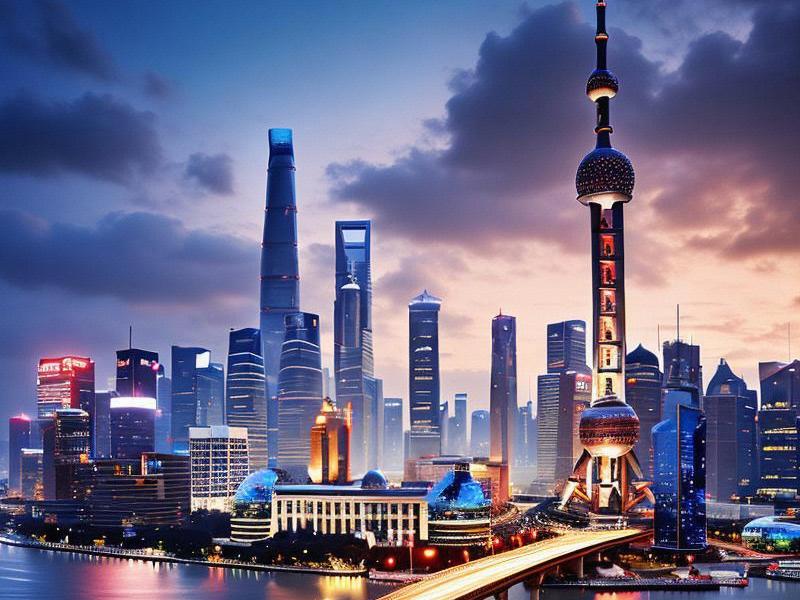
Shanghai, a city that has long been a beacon of China's economic prowess, is now experiencing a renaissance that transcends its financial might. This vibrant metropolis, with its rich history and dynamic spirit, is undergoing a profound transformation that encompasses not only its economy but also its culture, technology, and urban landscape.
The cultural revival of Shanghai is evident in the city's burgeoning arts scene. Once known primarily for its bustling markets and towering skyscrapers, Shanghai is now home to a thriving arts community. The city's galleries, theaters, and concert halls are alive with creativity, showcasing everything from traditional Chinese art to cutting-edge contemporary works. The opening of the Power Station of Art, a former power plant turned world-class art museum, is a testament to this cultural shift. This institution has become a hub for artists and art lovers alike, hosting exhibitions that attract visitors from around the globe.
Moreover, Shanghai's commitment to preserving its historical heritage is evident in the restoration of its iconic landmarks. The Bund, once a symbol of colonialism, has been transformed into a modern waterfront promenade, blending the old with the new. The historic French Concession, with its charming cobblestone streets and European-style architecture, has been revitalized, offering a glimpse into the city's past while catering to the tastes of contemporary urbanites.
The city's cultural renaissance is not limited to the arts; it extends to its culinary scene as well. Shanghai cuisine, known for its delicate flavors and intricate preparation, is enjoying a global resurgence. The city's chefs are experimenting with fusion dishes, blending traditional Shanghainese ingredients with international techniques, creating a unique culinary experience that reflects the city's cosmopolitan character.
上海龙凤论坛爱宝贝419 In parallel with its cultural revival, Shanghai is at the forefront of technological innovation. The city has established itself as a global leader in artificial intelligence (AI), green energy, and smart city technologies. Its skyline is dotted with futuristic skyscrapers that house state-of-the-art research facilities and tech companies. The Zhangjiang Hi-Tech Park, often referred to as "China's Silicon Valley," is a hub for high-tech enterprises, attracting talent and investment from around the world.
Shanghai's commitment to sustainability is evident in its efforts to crteeaa greener, more livable city. The city has implemented various initiatives to reduce pollution and promote renewable energy. For instance, the installation of solar panels on public buildings and the expansion of its electric vehicle charging network are steps towards a more sustainable future. Additionally, the city's green spaces, such as Century Park and People's Square, provide residents with areas to relax and connect with nature amidst the urban sprawl.
The integration of technology into urban life is another hallmark of Shanghai's transformation. The city has embraced the concept of a smart city, utilizing data and technology to improve the quality of life for its residents. Smart traffic management systems, efficient public transportation networks, and digital services are making the city more convenient and accessible. The launch of the Shanghai Municipal Cloud Computing Center has further enhanced the city's ability to manage and analyze large volumes of data, enabling more informed decision-making.
Shanghai's renaissance is also reflected in its educational institutions. The city is home to prestigious universities and research centers that are at the cutting edge of academic and scientific research. Fudan University and Tongji University are just two examples of institutions that are producing world-class graduates and conducting groundbreaking research in fields such as medicine, engineering, and environmental science. These institutions are playing a crucial role in driving the city's innovation and development.
上海花千坊龙凤 The city's global influence is evident in its role as a major international trade hub. Shanghai's port is one of the busiest in the world, facilitating the movement of goods and connecting China to markets around the globe. The city's free trade zones and international business districts are magnets for foreign investment, attracting multinational corporations and startups alike. Shanghai's strategic location and robust infrastructure make it an ideal destination for businesses seeking to expand their reach in Asia.
Culturally, Shanghai's influence is felt through its contributions to film, fashion, and design. The city has a rich cinematic history, with the Shanghai International Film Festival being one of the most prestigious events in the global film calendar. Shanghai's fashion scene is equally vibrant, with designers and brands from around the world showcasing their latest collections at the Shanghai Fashion Week. The city's design industry is thriving, with creative professionals and organizations pushing the boundaries of innovation and aesthetics.
The people of Shanghai are at the heart of the city's renaissance. The city's diverse population, made up of people from all walks of life, contributes to its rich cultural tapestry. The locals' passion for their city and their willingness to embrace change are key drivers of Shanghai's transformation. The city's entrepreneurial spirit and innovative mindset are reflected in the countless startups and small businesses that are springing up across the city.
爱上海同城对对碰交友论坛 However, the rapid pace of development in Shanghai is not without challenges. The city must balance its economic growth with the need to address issues such as housing affordability, environmental sustainability, and social inequality. The government has implemented various policies to tackle these challenges, including affordable housing programs, environmental regulations, and social welfare initiatives.
Looking ahead, Shanghai's renaissance is poised to continue. The city's vision for the future includes becoming a global center for innovation, culture, and sustainability. With its strategic location, robust infrastructure, and dynamic population, Shanghai is well-positioned to achieve its goals. The city's journey is a testament to the resilience and adaptability of urban centers in the face of change.
In conclusion, Shanghai's renaissance is a story of transformation and renewal. The city's cultural revival, technological innovation, and urban development are reshaping its identity and enhancing its global influence. As Shanghai continues to evolve, it serves as a model for other cities around the world, demonstrating how a city can embrace change and thrive in an increasingly interconnected world.
